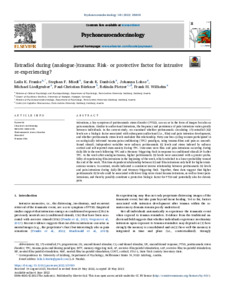|
Estradiol during (analogue-)trauma: Risk- or protective factor for intrusive re-experiencing?
Franke, Laila Katharina
;
Miedl, Stephan Franz
;
Danböck, Sarah K.
;
Lohse, Johanna
;
Liedlgruber, Michael
;
Bürkner, Paul-Christian
;
Pletzer, Belinda
;
Wilhelm, Frank H.
![[img]](https://madoc.bib.uni-mannheim.de/65286/1.hassmallThumbnailVersion/1-s2.0-S0306453022001603-main.pdf)  Vorschau |
|
PDF
1-s2.0-S0306453022001603-main.pdf
- Veröffentlichte Version
Download (4MB)
|
|
DOI:
|
https://doi.org/10.1016/j.psyneuen.2022.105819
|
|
URL:
|
https://www.sciencedirect.com/science/article/pii/...
|
|
Weitere URL:
|
https://www.researchgate.net/publication/361110844...
|
|
URN:
|
urn:nbn:de:bsz:180-madoc-652868
|
|
Dokumenttyp:
|
Zeitschriftenartikel
|
|
Erscheinungsjahr:
|
2022
|
|
Titel einer Zeitschrift oder einer Reihe:
|
Psychoneuroendocrinology
|
|
Band/Volume:
|
143
|
|
Heft/Issue:
|
Article 105819
|
|
Seitenbereich:
|
1-12
|
|
Ort der Veröffentlichung:
|
Amsterdam [u.a.]
|
|
Verlag:
|
Elsevier
|
|
ISSN:
|
0306-4530 , 1873-3360
|
|
Sprache der Veröffentlichung:
|
Englisch
|
|
Einrichtung:
|
Fakultät für Sozialwissenschaften > Klinische u. Biologische Psychologie u. Psychotherapie (Alpers 2010-)
|
|
Bereits vorhandene Lizenz:
|
 Creative Commons Namensnennung 4.0 International (CC BY 4.0) Creative Commons Namensnennung 4.0 International (CC BY 4.0)
|
|
Fachgebiet:
|
150 Psychologie
610 Medizin, Gesundheit
|
|
Freie Schlagwörter (Englisch):
|
classical conditioning , intrusive memories , posttraumatic stress disorder , estradiol , trauma film
|
|
Abstract:
|
Intrusions, a key symptom of posttraumatic stress disorder (PTSD), can occur in the form of images but also as pain sensations. Similar to audiovisual intrusions, the frequency and persistence of pain intrusions varies greatly between individuals. In the current study, we examined whether peritraumatic circulating 17β-estradiol (E2) levels are a biologic factor associated with subsequent audiovisual (i.e., film) and pain intrusion development, and whether peritraumatic stress levels modulate this relationship. Forty-one free-cycling women participated in an ecologically informed trauma-pain-conditioning (TPC) paradigm, using trauma-films and pain as unconditioned stimuli. Independent variables were salivary peritraumatic E2 levels and stress indexed by salivary cortisol and self-reported state-anxiety during TPC. Outcomes were film- and pain-intrusions occurring during daily-life in the week following TPC and a Memory-Triggering-Task in response to conditioned stimuli 24 h after TPC. In the week after analogue-trauma, higher peritraumatic E2 levels were associated with a greater probability of experiencing film-intrusions in the beginning of the week, which switched to a lower probability toward the end of the week. This time-dependent relationship between E2 and film-intrusions only held for higher state-anxious women. In contrast, results indicated a consistent inverse relationship between peritraumatic E2 levels and pain-intrusions during daily-life and Memory-Triggering-Task. Together, these data suggest that higher peritraumatic E2 levels could be associated with lower long-term visual trauma intrusions, as well as lower pain-intrusions, and thereby possibly constitute a protective biologic factor for PTSD and potentially also for chronic pain.
|
 | Das Dokument wird vom Publikationsserver der Universitätsbibliothek Mannheim bereitgestellt. |
 | Dieser Datensatz wurde nicht während einer Tätigkeit an der Universität Mannheim veröffentlicht, dies ist eine Externe Publikation. |
 Suche Autoren in Suche Autoren in
BASE:
Franke, Laila Katharina
;
Miedl, Stephan Franz
;
Danböck, Sarah K.
;
Lohse, Johanna
;
Liedlgruber, Michael
;
Bürkner, Paul-Christian
;
Pletzer, Belinda
;
Wilhelm, Frank H.
Google Scholar:
Franke, Laila Katharina
;
Miedl, Stephan Franz
;
Danböck, Sarah K.
;
Lohse, Johanna
;
Liedlgruber, Michael
;
Bürkner, Paul-Christian
;
Pletzer, Belinda
;
Wilhelm, Frank H.
ORCID:
Franke, Laila Katharina ; Miedl, Stephan Franz ; Danböck, Sarah K.  ORCID: 0000-0001-9989-1146 ORCID: 0000-0001-9989-1146 ; Lohse, Johanna ; Liedlgruber, Michael ; Bürkner, Paul-Christian ; Pletzer, Belinda ; Wilhelm, Frank H.
Sie haben einen Fehler gefunden? Teilen Sie uns Ihren Korrekturwunsch bitte hier mit: E-Mail
Actions (login required)
 |
Eintrag anzeigen |
|
 ORCID: 0000-0001-9989-1146 ; Lohse, Johanna ; Liedlgruber, Michael ; Bürkner, Paul-Christian ; Pletzer, Belinda ; Wilhelm, Frank H.
ORCID: 0000-0001-9989-1146 ; Lohse, Johanna ; Liedlgruber, Michael ; Bürkner, Paul-Christian ; Pletzer, Belinda ; Wilhelm, Frank H.



 Creative Commons Namensnennung 4.0 International (CC BY 4.0)
Creative Commons Namensnennung 4.0 International (CC BY 4.0) Suche Autoren in
Suche Autoren in